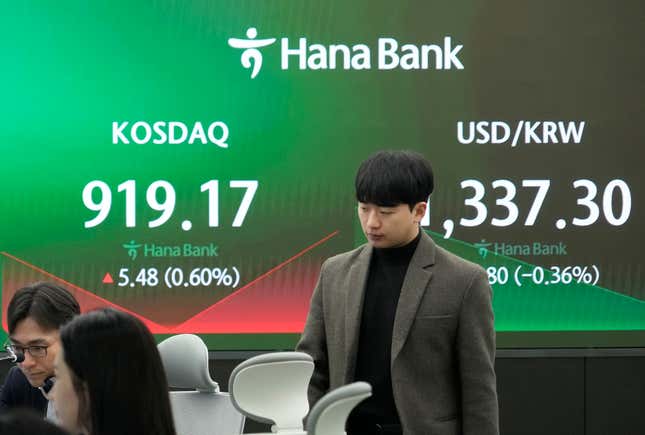
TOKYO (AP) — Asian shares were mixed in muted trading Tuesday, as buying in some markets was soon erased by profit-taking.
Japan's benchmark Nikkei 225, where computer chip-related issues had interested investors early, reversed course to slip nearly 0.2% in morning trading to 40,336.31.
Australia's S&P/ASX 200 fell 0.1% to 7,801.20. South Korea's Kospi added 1.2% to 2,771.23. Hong Kong's Hang Seng gained 0.6% to 16,563.58, while the Shanghai Composite added 0.2% to 3,030.76.
Analysts have been watching various global uncertainties, including in the Middle East and Russia, that affect energy prices as well as investor sentiments.
In energy trading, benchmark U.S. crude rose 26 cents to $82.21 a barrel. Brent crude, the international standard, added 22 cents to $86.97 a barrel.
An attack late last week at a concert hall in Moscow was claimed by the Islamic State group. Gaza was in focus with the U.N. Security Council issuing its first demand for a cease-fire. The U.S. abstained, angering Israel.
“Potential flares in oil prices on geopolitical tensions remained ever present,” said Tan Jing Yi at Mizuho Bank.
Wall Street edged back further from its recent record heights, with the S&P 500 slipped 15.99 points, or 0.3%, to 5,218.19 in a quiet day of trading. The Dow Jones Industrial Average fell 162.26, or 0.4%, to 39,313.64, and the Nasdaq composite dropped 44.35, or 0.3%, to 16,384.47.
The big run last week was Wall Street's best of the year and sent all three indexes to records on Thursday. Stocks climbed as the Federal Reserve indicated it’s still likely to deliver several cuts to interest rates this year, as long as inflation keeps cooling.
That has the S&P 500 on track for another winning month in what’s been a nearly unstoppable run since late October. The strength has been durable as the economy has remained resilient, “but the longer the market goes up without a notable pullback, the closer we come to such a move taking place,” according to Chris Larkin, managing director, trading and investing at E-Trade from Morgan Stanley.
For the market to continue rallying, more companies will need to deliver strong earnings growth to justify high prices, say strategists at Morgan Stanley.
This week’s highlight for financial markets may be Friday’s report on U.S. consumer spending. It will also include the latest update on the measure of inflation that the Federal Reserve prefers to use. But U.S. markets will be closed in observance of Good Friday, and the bond market will close early on Thursday, which could bunch up trades in anticipation of the report.
Despite a string of recent reports that showed inflation remaining hotter than expected, the Federal Reserve seems to expect inflation to continue its longer-term cooling trend.
In the bond market, Treasury yields climbed. The 10-year yield rose to 4.24% from 4.20% late Friday.
In currency trading, the U.S. dollar edged down to 151.29 Japanese yen from 151.41 yen. The euro cost $1.0843, little changed from $1.0840.